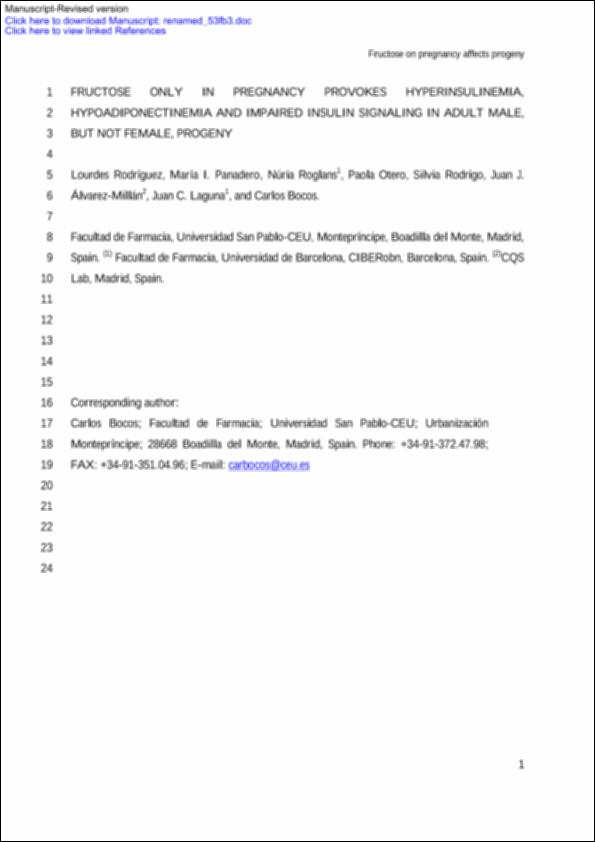Please use this identifier to cite or link to this item:
http://hdl.handle.net/10637/12937Fructose only in pregnancy provokes hyperinsulinemia, hypoadiponectinemia and impaired insulin signaling in adult male, but not female, progeny.
| Title: | Fructose only in pregnancy provokes hyperinsulinemia, hypoadiponectinemia and impaired insulin signaling in adult male, but not female, progeny. |
| Authors : | Rodríguez, Lourdes Bocos de Prada, Carlos Panadero Antón, María Isabel |
| Keywords: | Fructose pregnancy; Fetal programming; Metabolic syndrome. |
| Abstract: | Purpose Fructose intake from added sugars correlates with the epidemic rise in metabolic syndrome and cardiovascular diseases. However, consumption of beverages containing fructose is allowed during gestation. Recently, we found that an intake of fructose (10% 5 wt/vol) throughout gestation produces impaired fetal leptin signaling and hepatic steatosis. Therefore, we have investigated whether fructose intake during pregnancy produces subsequent changes in the progeny, when adult. 8 Methods Fed 261-day-old male and female descendants from fructose-fed, control or glucose9 fed mothers were used. Plasma was used to analyze glucose, insulin, leptin, and adiponectin. Hepatic expression of proteins related to insulin signaling was determined. Results Fructose intake throughout pregnancy did not produce alterations in the body weight of the progeny. Adult male progeny of fructose-fed mothers had elevated levels of insulin without a parallel increase in phosphorylation of protein kinase-B. However, they displayed an augmented serine phosphorylation of insulin receptor substrate-2, indicating reduced insulin signal transduction. In agreement, adiponectin levels, which have been positively related to insulin sensitivity, were lower in male descendants from fructose-fed mothers than in the other two groups. Furthermore, mRNA levels for insulin-responsive genes were not affected (phosphoenol pyruvate carboxykinase, glucose-6-phosphatase) or they were decreased (sterol response element-binding protein-1c) in the livers of male progeny from fructose-supplemented rats. On the contrary, adult female rats from fructose-fed mothers did not exhibit any of these disturbances. Conclusion Maternal fructose, but not glucose, intake confined to the prenatal stage provokes impaired insulin signal transduction, hyperinsulinemia, and hypoadiponectinemia in adult male, but not female, progeny. |
| Description: | En: European Journal of Nutrition. 2016. vol. 55 : 665-674 p. e-ISSN 1436-6215 |
| URI: | http://hdl.handle.net/10637/12937 |
| Rights : | http://creativecommons.org/licenses/by-nc-nd/4.0/deed.es |
| Issue Date: | 10-Aug-2016 |
| Center : | Universidad San Pablo-CEU |
| Appears in Collections: | Facultad de Farmacia |
Items in DSpace are protected by copyright, with all rights reserved, unless otherwise indicated.


